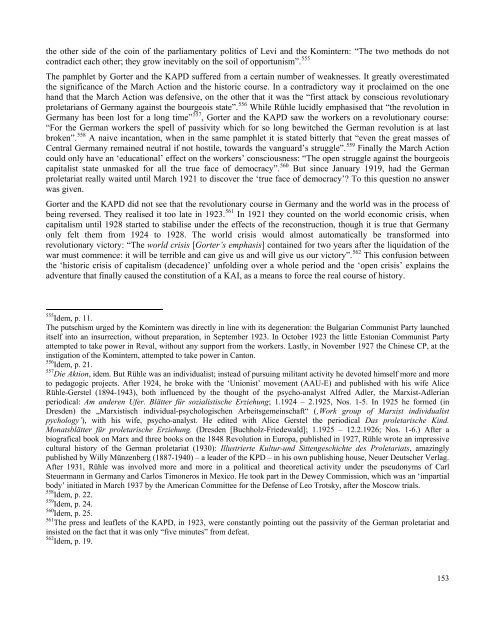The German-Dutch Communist Left - Libcom
The German-Dutch Communist Left - Libcom
The German-Dutch Communist Left - Libcom
You also want an ePaper? Increase the reach of your titles
YUMPU automatically turns print PDFs into web optimized ePapers that Google loves.
the other side of the coin of the parliamentary politics of Levi and the Komintern: “<strong>The</strong> two methods do not<br />
contradict each other; they grow inevitably on the soil of opportunism”. 555<br />
<strong>The</strong> pamphlet by Gorter and the KAPD suffered from a certain number of weaknesses. It greatly overestimated<br />
the significance of the March Action and the historic course. In a contradictory way it proclaimed on the one<br />
hand that the March Action was defensive, on the other that it was the “first attack by conscious revolutionary<br />
proletarians of <strong>German</strong>y against the bourgeois state”. 556 While Rühle lucidly emphasised that “the revolution in<br />
<strong>German</strong>y has been lost for a long time” 557 , Gorter and the KAPD saw the workers on a revolutionary course:<br />
“For the <strong>German</strong> workers the spell of passivity which for so long bewitched the <strong>German</strong> revolution is at last<br />
broken”. 558 A naive incantation, when in the same pamphlet it is stated bitterly that “even the great masses of<br />
Central <strong>German</strong>y remained neutral if not hostile, towards the vanguard’s struggle”. 559 Finally the March Action<br />
could only have an ‘educational’ effect on the workers’ consciousness: “<strong>The</strong> open struggle against the bourgeois<br />
capitalist state unmasked for all the true face of democracy”. 560 But since January 1919, had the <strong>German</strong><br />
proletariat really waited until March 1921 to discover the ‘true face of democracy’? To this question no answer<br />
was given.<br />
Gorter and the KAPD did not see that the revolutionary course in <strong>German</strong>y and the world was in the process of<br />
being reversed. <strong>The</strong>y realised it too late in 1923. 561 In 1921 they counted on the world economic crisis, when<br />
capitalism until 1928 started to stabilise under the effects of the reconstruction, though it is true that <strong>German</strong>y<br />
only felt them from 1924 to 1928. <strong>The</strong> world crisis would almost automatically be transformed into<br />
revolutionary victory: “<strong>The</strong> world crisis [Gorter’s emphasis] contained for two years after the liquidation of the<br />
war must commence: it will be terrible and can give us and will give us our victory”. 562 This confusion between<br />
the ‘historic crisis of capitalism (decadence)’ unfolding over a whole period and the ‘open crisis’ explains the<br />
adventure that finally caused the constitution of a KAI, as a means to force the real course of history.<br />
555 Idem, p. 11.<br />
<strong>The</strong> putschism urged by the Komintern was directly in line with its degeneration: the Bulgarian <strong>Communist</strong> Party launched<br />
itself into an insurrection, without preparation, in September 1923. In October 1923 the little Estonian <strong>Communist</strong> Party<br />
attempted to take power in Reval, without any support from the workers. Lastly, in November 1927 the Chinese CP, at the<br />
instigation of the Komintern, attempted to take power in Canton.<br />
556 Idem, p. 21.<br />
557 Die Aktion, idem. But Rühle was an individualist; instead of pursuing militant activity he devoted himself more and more<br />
to pedagogic projects. After 1924, he broke with the ‘Unionist’ movement (AAU-E) and published with his wife Alice<br />
Rühle-Gerstel (1894-1943), both influenced by the thought of the psycho-analyst Alfred Adler, the Marxist-Adlerian<br />
periodical: Am anderen Ufer. Blätter für sozialistische Erziehung; 1.1924 – 2.1925, Nos. 1-5. In 1925 he formed (in<br />
Dresden) the „Marxistisch individual-psychologischen Arbeitsgemeinschaft“ (‚Work group of Marxist individualist<br />
pychology’), with his wife, psycho-analyst. He edited with Alice Gerstel the periodical Das proletarische Kind.<br />
Monatsblätter für proletarische Erziehung. (Dresden [Buchholz-Friedewald]; 1.1925 – 12.2.1926; Nos. 1-6.) After a<br />
biografical book on Marx and three books on the 1848 Revolution in Europa, published in 1927, Rühle wrote an impressive<br />
cultural history of the <strong>German</strong> proletariat (1930): Illustrierte Kultur-und Sittengeschichte des Proletariats, amazingly<br />
published by Willy Münzenberg (1887-1940) – a leader of the KPD – in his own publishing house, Neuer Deutscher Verlag.<br />
After 1931, Rühle was involved more and more in a political and theoretical activity under the pseudonyms of Carl<br />
Steuermann in <strong>German</strong>y and Carlos Timoneros in Mexico. He took part in the Dewey Commission, which was an ‘impartial<br />
body’ initiated in March 1937 by the American Committee for the Defense of Leo Trotsky, after the Moscow trials.<br />
558 Idem, p. 22.<br />
559 Idem, p. 24.<br />
560 Idem, p. 25.<br />
561 <strong>The</strong> press and leaflets of the KAPD, in 1923, were constantly pointing out the passivity of the <strong>German</strong> proletariat and<br />
insisted on the fact that it was only “five minutes” from defeat.<br />
562 Idem, p. 19.<br />
153
















